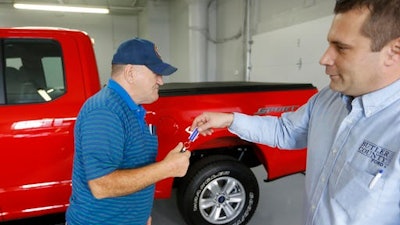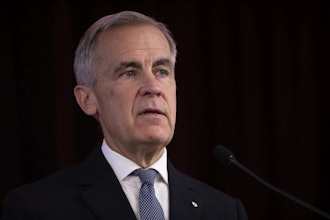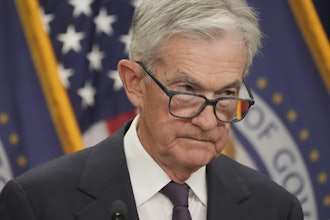
DETROIT (AP) — U.S. car shoppers will find plentiful deals, relatively low interest rates and lots of high-tech choices in the market this year.
"It's a good time to buy a car now, and it should be for the rest of the year," says Jessica Caldwell, an analyst with the car-shopping site Edmunds.com
New-vehicle sales hit a record of 17.55 million in the U.S. last year. While they're not expected to top that this year, demand is still strong. Many of the factors that fueled sales last year are still in place, like solid consumer confidence and low gas prices. New technology like Apple CarPlay and automatic emergency braking is luring buyers. And many people still need to replace aging cars. The average age of a vehicle on U.S. roads climbed to 11.6 years in 2016.
Here are some things to watch in the car market this year:
PRICES: The average price people pay for a new car rose to $32,000 in December, a monthly record, according to the consulting firm LMC Automotive. Analysts say new-vehicle prices will continue to rise in 2017. There are two main reasons: More customers are buying SUVs, which are pricier than cars, and they're loading them up with features, like the premium audio and automatic liftgate package that adds $940 to the cost of a Toyota RAV4 SUV.
As a result, more buyers are leasing, which helps lower the monthly payment. The average monthly lease payment for a new car is currently $405; the average monthly loan payment is $495, according to Experian Automotive. Buyers are also lengthening the terms of their car loans to lower their payments. The average new-vehicle loan term is now 68 months, up from 62 months in 2009. About 1 percent of loans stretch out 85 months or more.
INCENTIVES: Prices may be at record levels, but — luckily for consumers — deals are, too. Automakers were offering around $4,000 per vehicle in incentives at the end of 2016, and that could inch up even further this year, says Jesse Toprak, CEO of the car-shopping site CarHub.com. Deals are coming in the form of bonus cash — like a current $1,000 offer from Chevrolet — and low-interest financing, such as Subaru's zero-percent financing offer on the Outback and Forester SUVs. Look for some of the highest incentives on slow-selling small and midsize cars, like the Toyota Camry and Chevrolet Sonic, as well as hybrids like the Ford C-Max. Incentives will likely pick up in March and April, when more buyers tend to head to dealerships.
Analysts say automakers are trying to be smarter with incentives, having been burned in the past. Deals are targeted at specific vehicles, regions and even individual dealerships. Incentives could also taper off a bit if automakers cut car production to match the lower demand.
USED CARS: A big supply of vehicles leased two or three years ago is returning to the market. Prices for used SUVs and trucks, which are in high demand, will likely stay stable this year, but used car prices will fall, says Michelle Krebs, a senior analyst with AutoTrader.com. Krebs says buyers will have to do their homework to see if they should buy a new or a nearly-new car. New cars might have the latest technology, but a certified-pre-owned car might offer perks like free maintenance or a few months of OnStar or satellite radio. The current average monthly payment on a used car is $362, Experian says, up only slightly from a year ago.
One downside for consumers: Falling used-car values mean they'll get less for vehicles that they're trading in, says Patrick Min, a senior industry analyst at the car-buying site TrueCar.com.
GAS PRICES: Low gas prices have fuel the U.S. SUV boom, and that's likely to continue. Gas prices — which ended 2016 at $2.25 per gallon — are expected to average $2.38 per gallon this year and $2.41 in 2018, according to the U.S. Energy Department.
INTEREST RATES: The Federal Reserve boosted its benchmark rate by a quarter-point last month, to a still-low range of 0.5 percent to 0.75 percent. The rate has been near zero since the recession. Toprak says the impact on car buyers will likely be negligible. Even an increase of 2 percentage points would only add about $50 more per month to a car payment, he says. "That's not going to stop people," he says. But increasing interest rates could cause lenders to tighten their criteria, which could shut some buyers out of the market.





















